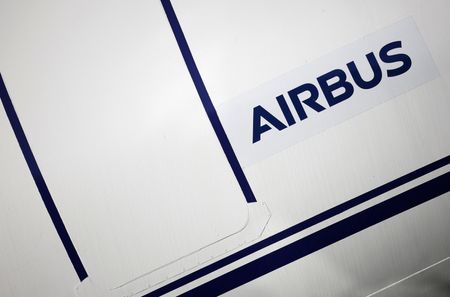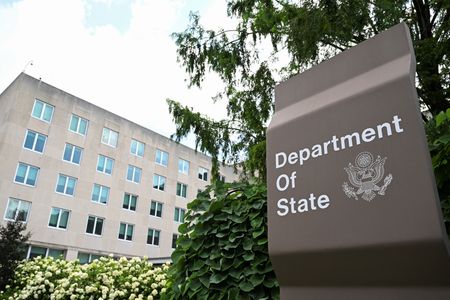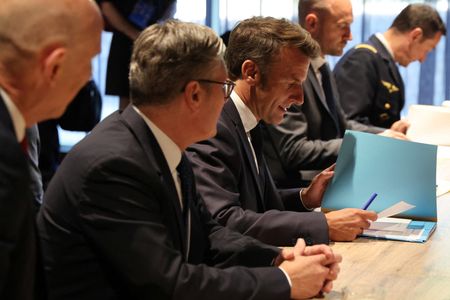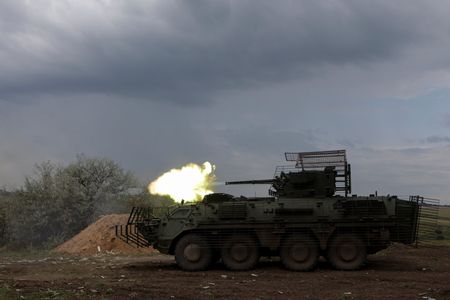By Tim Hepher and Florence Loeve
PARIS (Reuters) -The head of Europe’s Airbus called for a return to tariff-free trading for aerospace on Wednesday, joining a chorus of U.S. industry leaders seeking relief from a growing tariff war in which Airbus warned there could be “only losers”.
CEO Guillaume Faury said U.S. tariffs and the prospect of European retaliation had not so far had a significant direct impact on supply chains and remained manageable for now, but that it was closely watching air travel, airlines and suppliers.
Unveiling stronger-than-expected quarterly results buoyed by defence improvements, Faury called for a return to a 1979 treaty between 33 nations that spared aircraft and parts from duties.
“The complete industry has developed itself around that concept, with a lot of back and forth across the Atlantic. Given that situation, that’s a benefit to everyone,” Faury said.
Aerospace sectors in the U.S. and European Union are each other’s biggest customers, European officials say, even though they are home to bitter rivals Airbus and Boeing.
In Washington, an aviation coalition has been lobbying lawmakers and the White House to lift tariffs in favour of enforcing the 1979 treaty brokered by the World Trade Organization.
The CEOs of several companies including Boeing and GE Aerospace have directly raised the issue with U.S. President Donald Trump, who has said tariffs will increase U.S. jobs, according to a letter sent to Congress and lobbyists.
Faury said Airbus was talking to customers and suppliers, but ruled out picking up tariff costs for U.S. airlines taking jets from Europe, rather than Alabama where some get assembled.
Delta Air Lines CEO Ed Bastian said this month the carrier would defer deliveries rather than pay tariffs.
Airbus said it was too early to quantify the impact of tariffs and reaffirmed 2025 guidance that ignores the trade war.
ENGINE DELAYS
While sticking to a goal for 7% higher deliveries in 2025, Airbus signalled they would fall in the second quarter, having fallen in the first – leaving much to do in the second half.
It was unable to deliver 17 aircraft in the first quarter due to delays in receiving engines from CFM International. Faury said the number of finished jets missing engines would rise again this quarter.
“It will continue to get worse before it gets better,” he told analysts. “We think it will… be back to a normal situation at the summer.”
CFM, co-owned by GE and France’s Safran, reiterated that it was confident of accelerating output in the second quarter.
Airbus, which finalised an agreement on Monday to take over part of ailing Spirit AeroSystems, said the U.S. aerostructure supplier’s challenges continued to pressure the ramp-up of the Airbus A320 and A350 jets.
For the first quarter, Airbus said underlying operating profit rose 8% to 624 million euros ($707 million) and revenues gained 6% to 13.54 billion euros.
Analysts had on average expected core profit of 602 million euros on revenues of 12.95 billion, according to consensus data compiled by the company. Airbus burned less cash than expected.
Airbus struck a more positive tone over future production of the troubled A400M military airlifter, saying it was in “constructive” talks with European purchasing nations.
The A400M has been hit by delays, partial cancellations and slow exports, with orders due to run out in 2028. But industry sources say higher European arms spending could revive interest from buyers that curbed deliveries, such as France and Spain.
($1 = 0.8821 euros)
(Reporting by Tim Hepher and Florence Loeve; Additional reporting by David Shepardson; Editing by GV De Clercq, Richard Chang and Jan Harvey)










